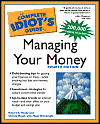|
Personal
Money Management
(Home)
Book
Summaries
A
Simple Plan
Introduction
1.
Catch a Vision
2.
Work
Hard
3.
Grow in Wisdom
4.
Live Beneath Your Means
5.
Invest
Wisely
6.
Help Others
Money
Lesson
Plans
Money
Quotes, Jokes Activities and Stories
Money
Links
Money
Statistics |
The
Complete Idiot's Guide to Managing Your Money
A Money
Book Summary
 The Complete Idiot's Guide to Managing Your Money, 4th Edition:
The Complete Idiot's Guide to Managing Your Money, 4th Edition:
 Solid advice on getting
out of debt and making the most of your money, by Robert K.
Heady and Christy Heady, with Hugo Ottolenghi, (Alpha, a member of
Penguin Group, USA, Inc.) Fourth Edition. Solid advice on getting
out of debt and making the most of your money, by Robert K.
Heady and Christy Heady, with Hugo Ottolenghi, (Alpha, a member of
Penguin Group, USA, Inc.) Fourth Edition.
Useful stuff can come in small
packages! In 94 small pages (I read the "digest version"
which I purchased for $2.95 at the grocery store checkout) with lots of white space, section
divisions, bullet points and icons, you can cover a lot of ground with
very little effort. When tackling a new subject, I often like to read
small books before the big ones, just to familiarize myself with the
territory.
Author Robert Heady was the founding
publisher of Bank Rate Monitor. His daughter Christy is a financial
columnist who writes nationally syndicated columns.
It's divided into six chapters:
Chapter 1: Financial
Planning Made Simple
Commit yourself to doing something
about your finances. Make financial decisions regularly. Learn to
enjoy making decisions! Right or wrong, you learn something as you
go. Go ahead, do your homework and make those financial decisions
that you've been putting off.
Set some short-term and long-term
goals and stick to your plan.
Example Short-Term Goals:
- Pay off your credit cards
- Build up an emergency fund
- Buy a house
- Save for a European Vacation
Example Long-Term Goals:
- Pay for your kids' college
- Retire wealthy
Beside each goal, write how much
money it will take to accomplish that goal.
Chapter 2: Managing
the Debt Monster
Determine your net worth by
subtracting your liabilities (what you owe) from your assets (what
you own). Rules of thumb:
- "Current assets should be
approximately two times greater than current liabilities."
- "...your monthly debt should
not exceed 36 percent of your monthly income."
Find out where your money is going on
a monthly basis in categories such as Housing, Cars, Clothing, Food,
Medical, Education, Gifts, etc.
Create a spending plan (budget) and
stick with it! This is the way to take control of your finances!
If you're overspending, find ways to
cut back. For example, the average American spends around $5,000 a
year eating out!
Establish an emergency fund of about
three months of living expenses so that you don't have to get into
debt to bail yourself out of a crisis.
If you're over your head in
debt:
- contact your local Consumer Credit
Counseling Service. 1-800-388-CCCS. Or, the National Center for
Financial Education.
- If you're talking to deal with
another company, make sure they're a member of either the
National Foundation for Credit Couseling or the Association of
Consumer Credit Counseling Agencies. Also, the local Chamber of
Commerce. The best ones are nonprofit corporations. Don't go if
its phone number isn't listed or you can't visit its offices.
Make sure it will provide a complete list of its fees and
charges.
Paying a minimum amount on your
credit card each month is a raw deal over time. Example:
You've got a $3,000 balance on your 18 percent credit card. Each
month, you pay 2 percent of the balance. At that rate, you'll pay
$7,587 over 36 years!
Some ways to escape
the debt trap:
- Stop ignoring your debt. It
won't go away by itself. Start dealing with it now, before the
problem gets worse.
- Track your spending to find
out where your money is going.
- Cut back where you can.
Cutting back on those small, regular expenses, like eating out,
can make a huge difference.Many creditors will reduce their
rates and fees if you ask.
- Always pay more than the
minimum amount due on your credit cards.
- Save toward expenses that don't
occur every month, like insurance, vacations, birthdays and
Christmas.
- Borrowing more money to
consolidate your debts often leads to worse debt. Most
people return to their bad habits once they get their new loan.
A home equity loan puts your home at risk.
- Don't dip into your retirement,
like your 401 (k).
- Realize it will take some time.
Be patient. You probably didn't get in debt over night. It will
take some time to get out of debt as well.
- Bankruptcy is a last resort,
not an easy alternative.
Some ways to stay out
of debt:
- Don't buy now
and pay later.
- Don't get cash
advances. Some charge up to 32 percent, plus a transaction
fee!
- Pay your bills
on time. Always.
Chapter 3: Everyday
Money Language You Should Know
Know where to go for
accurate financial information.
Newsletters and
Websites
Hulbert
Financial Digest, at www.marketwatch.com
.
More specifically:
http://www3.marketwatch.com/Store/products/hfd_profile.aspx?dist=top10hfd&cat=mf
Let's say that a friend told you
that you ought to subscribe to somebody's financial newsletter
to get good advice about your investments. Mark Hulbert has done
a tremendous service by reviewing the advice of over 160
financial newsletters, showing how their forecasts, predictions
and recommendations turn out over time. Cost: $25 for a report
on one newsletter. Potential savings from bad advice and bad
investments: megabucks.
Choose your advisors carefully.
According to Hulbert, "over 80% of advisory letters fail to
beat the market over the long term." (From Hulbert site)
Morningstar
Fund Investor
www.morningstar.com
- Tons of great research,
ratings and advice for investors.
No-Load Fund
Investor, by Sheldon Jacobs
www.sheldonjacobs.com
- tracks
996 no-load funds
Other Sites
www.msn.com
www.cnn.com
www.bloomberg.com
www.smartmoney.com
www.cardtrak.com
www.bankrate.com
Internet
Calculators
http://mortgage.interest.com/content/calculators/index.asp
www.bloomberg.com/analysis/calculators/mortgage.html
www.fmcalcs.com/tools-tcc/fanniemae/calculator
Magazines and
Newspapers
USA
Today - See their "Money"
section.
Money
Magazine
Smart Money
Kiplinger's
Personal Finance
The Wall
Street Journal
Business
Week
Investor's
Business Daily
On Comparing Rates
Always ask to speak
to the bank officer rather than a teller.
If the way a rate
is calculated seems a little confusing, or you don't understand
all the fees and such, ask this simple question to get to the
bottom line:
"If I give
you my money today, how much will I have in my account at the
end of one year - in dollars and cents, not percent -
after subtracting all fees and charges?"
Ask the same
question whenever you borrow:
"How much
will my total cost of the loan be in dollars?"
Ask for a bank or
broker's complete fee schedule. Study it.
Chapter 4: Savings
and CD Accounts: Beating the Averages
Three Types:
Passbook Savings
Is liquid,
meaning you can withdraw your money at any time with no
penalty.
Money
Markets
Also liquid, but
with some accounts you need to make sure you don't get under a
certain amount in the account.
CDs
Not liquid, but
usually better interest. If you withdraw it before the agreed
upon term, you're penalized, losing, for example, three to six
month's interest.
Finding the best:
Credit unions generally give better interest on CDs than banks
or thrifts. All three are backed by the federal
government up to $100,000 per person. Nobody has ever lost money
in a federally insured bank up to the $100,000 limit, even
during the depression, when many banks closed. If you put
$100,000 in one bank and $100,000 in another bank, all would be
insured.
Tips:
- Shop around for
the best rates. Higher paying out-of-state banks can be just
as safe. Most internet banks are insured by the FDIC (make sure
to check!). Check places like www.bankrate.com
for the best rates.
- "Ladder"
your CD's, some in six month, some in one year, some in two
year. This gives some protection against the rise and fall of
rates and gives you some money coming due at any given time in
case of an emergency.
- Don't be afraid
to negotiate. Ask, for example, if they can drop a fee. Good
question: "Are you sure you've told me about all the ways I
can earn more interest, avoid fees, and save on my loans?"
Chapter 5: The Right
Credit Card for You
"Engrave this in your mind. Credit cards are the main
reason so many Americans are up to their ears in debt and why the
bankruptcy rate is so high." (p. 64)
- Never charge more than you can pay
off entirely each month.
- Read the fine print. You must know
all about annual fees, fees for charging over the limit,
inactivity fees, will the rate go up if you miss a payment, etc.
- Don't get more than one or two
cards. Fewer cards can keep your risk of debt down and your credit
score up.
- Try bargaining. If you can get a
better deal with another credit card, tell them about it and see
if they will match it. Ask them to drop a fee so that you won't go
with another company. You'd be surprised what you can get.
- If you have bad credit, check into secured
cards, with which you can make purchases up to an amount you
keep in the bank. A good way to rebuild your credit
rating.
- Credit unions often offer credit
cards with better rates.
- Contact the Consumer Credit
Counseling Services if your payments get out of hand.
- Shop for a good grace period.
Sites to help choose the right card for
you:
www.bankrate.com
www.cardweb.com
www.creditcardgoodies.com
Chapter 6: Retiring
R-I-C-H!
There are three building blocks for
your retirement:
- Social Security
- Pension Plans
- Investment Assets [for example,
401(k)s and IRAs]
DON'T DEPEND ON SOCIAL SECURITY! It may
provide only 21 percent (for maximum wage earners, or 38% for average
wage earners) of your current income. (Call the Social Security
Administration at 1-800-772-1213 to find out how much you'll likely be
getting from them in retirement.) People simply aren't
saving enough.
"A Big Six accounting firm
survey shows that unless we save a great deal more than we currently
do, three out of four Americans over the age of 20 will have less
than half the money they need to retire and maintain their
pre-retirement stand of living." (p. 80)
- Start early. The person who
starts saving $100 a month at age 25 will retire with six times
the money of the person who puts off saving till age 45.
- Take advantage of tax-deferred
savings. Save $3,000 per year at 6% interest for 30 years in a
taxed account and you'll have $185,000. Put it in a tax free IRA
at the same interest for the same number of years and you'll have
$250,000.
- If you've got more than ten years
before retirement, invest for the long-term to get a better
return, especially in equities.
Click
for More Money Book Summaries
The Complete Idiot's
Guide to Managing Your Money Book Summary
Personal Money Management
Home Book Summaries Making Money Saving
Money
Investing Money Enjoying Money
|

